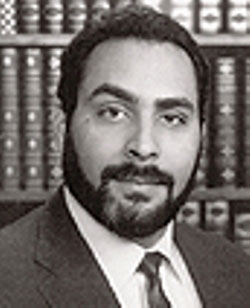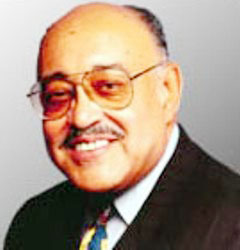They shared elected offices within the family
Legacies are very important when traditions are handed down from parents to children. In the history of Black elected officials, that legacy is a rare phenomenon. Below are two examples where elected officials (fathers) passed on the tradition to their receptive sons.


Curtis R. Tucker, Sr. and Curtis R. Tucker, Jr.
Assemblyman/Assemblyman
Assemblyman Curtis Tucker, Sr. (Tucker Sr.) represented the 50th district for 14 years (1974-1988) and according to his record, he was such a dominant political figure in his district that he won reelection in November, 1988, after his death–a feat even some live politicians could not achieve. That posthumous reelection–unprecedented in state history–triggered a special election three months later, and was easily won by his son, Curtis Tucker Jr. (Tucker Jr.) They became the first father and son ever to serve in the state legislature.
Born in Union, Louisiana, in 1918, Tucker Sr. was a soldier in the United States Army and taught at West Point Academy. On entering politics, he became the first Black on the Inglewood City Council in 1972. His appointment to the city council coincided with the city’s demographic shift–the Black population was increasing and so was its voting power. That city became the base of Tucker Sr’s. political endeavors and he became a powerhouse in the city and its politics. It was no coincidence that Inglewood became the first city in California to declare the birthday of Dr. Martin Luther King, Jr. as a public holiday.
Though a relatively young organization in the state, the Legislative Black Caucus (LBC), of which Tucker Sr. was a member, was instrumental in crafting legislation designed to promote racial and gender equality, and justice for the poor and under-represented. One of LBC’s major victories at that time was a bill authored by then Assemblywoman Maxine Waters solidifying the state’s opposition to the apartheid government of South Africa through divestment which outlawed investments with firms affiliated with that country and hastened the fall of the apartheid regime legally.
While in the Assembly, a part of Tucker Sr’s. legislative focus was health issues; he was chairman of the Assembly Health Committee. That legacy was reinforced by naming The Curtis R. Tucker Health Center, located in Inglewood, in his honor. He wanted to bequeath his legacy to his son, Tucker Jr., and when he died in office, his son ran and won his seat. In 1989 after a special election, Tucker Jr. became assemblyman and voters in the district began to allude to young Tucker’s ascendancy as a budding dynasty. He had emerged from obscurity to beat three other “seasoned” candidates, notwithstanding he had enormous advantages: name recognition and his father’s political allies. In addition, he had been a legislative aide to two other assembly members and had won a ready-made district–made ready by his father.
When Tucker Jr. had won the district, it was the 50th, but in 1992, redistricting due to changes in demographics resulted in the 51st Assembly District and he remained the assemblyman of the new district. There were no challengers on the Democratic side and the Republican side was tepid; it was an overwhelmingly Democratic district that included Inglewood, Hawthorne and Lawndale.
Tucker Jr. served as Chairman of the Assembly Governmental Organization Committee, Chairman of the LBC, Chairman of the Select Committee on the Los Angeles Unrest, and Vice Chairman of the Assembly Insurance Committee. He also sponsored a bill to ban the sale of cigarettes from vending machines except those in bars intending to curb the sale of tobacco products to minors. He served in the Assembly until 1996.


Willard H. Murray, Jr. and Kevin Murray
Assemblyman/ Senator
Born and raised in Los Angeles and first elected to the California State Assembly in 1988, Willard H. Murray, Jr. (W. Murray) served four terms representing the 52nd district which comprised of a diversed racial/ethnic mixed constituency and included Gardena, Lynwood, Paramount, and portions of Compton, Long Beach and Los Angeles. He was a Democrat.
While in the assembly, W. Murray served on the Budget, Local Government, Utilities and Commerce, and Education committees. He also chaired the Budget Subcommittee on State Administration and the California Legislative Black Caucus (CLBC). As a member of the Education committee, W. Murray was passionate about education; it was the focal point of his legislative agenda. And he focused his attention specifically on Compton which was a part of the legislative debate as it related to low-achieving schools that were being considered for special help from the state and a possible takeover.
To that end, W. Murray, introduced four bills directed at the Compton Unified School District. They ranged from reviews of the district teaching methods to the imminent state takeover of the low-achieving schools within the system. In addition, there were some problems that stemmed from the city’s changing demographics–between Blacks and Latinos–and legislative remedies alone could not correct, despite the efforts of W. Murray.
Also his efforts triggered newspaper headlines, “Assemblyman Seeks Outside Help for Schools,” that were sent out a barrage of negative responses from his constituents which only added fuel to the proverbial fire. W. Murray’s political profile was uncharacteristically raised, which heretofore was modestly low, since he had not been a newspaper chaser nor a headline grabber. According to media reports, W. Murray had stated, “The community is losing confidence that its students are receiving anything close to the quality of education justified by funding to the district.”
Born and raised in Los Angeles, W. Murray worked as an engineer in the Aerospace Division of TRW in the late 1950s and marched with Dr. Martin Luther King, Jr. and others prior to entering elective politics. He got his training while working as a staff member for several well-known Los Angeles elected officials including former City Councilmen Billy Mills and Robert Farrell, and former Lieutenant Governor Mervyn Dymally. In addition, W. Murray has held the position of senior consultant for the Senate Democratic Caucus.
W. Murray was also involved in community activities as a member of the Compton-NAACP, Los Angeles County Democratic Central Committee, the American Legion, YWCA, Big Brothers of Greater Los Angeles, Gardena Valley Democratic Club, American Red Cross-Los Angeles Chapter, the African American Cultural Center and numerous other political, community and civic organizations.
The father of Melinda and Kevin Murray (K. Murray), who joined his father in the state legislature, becoming the first father and son team to serve simultaneously in the assembly–W. Murray (A-52; 1988 to 1996) and K. Murray (A-47; 1994 to 1998). After serving in the Assembly, K Murray went on to become Senator Murray representing the 26th district. He earned a BA. from California State University, Northridge; an MBA from Loyola Marymount University in 1983, and a JD from Loyola Law School in 1987. Before entering politics, K. Murray practiced law in the field of entertainment, insurance and real estate. He also maintained a presence in the entertainment industry via consulting and management services.
As a Democrat, Assemblyman K. Murray served as the chair of the Transportation Committee and the founding chair of the Arts and Entertainment Committee. He was also assistant Democratic Floor Leader and Majority Whip. As a member of the Film Commission, K. Murray led the way to identify the need to protect consumers on the Internet. And he was also a member and chair of the CLBC; his 47th district consisted of 4.45 percent of Los Angeles County, including all of Culver City, most of View Park-Winsdor Hills; and portions of Ladera Heights, and the city of Los Angeles.
As Senator K. Murray, he continued his effort to stop Internet related crime by crafting a number of first-in-the-nation laws to protect consumers from identity theft, email spam and Internet spyware. He served as chairman of the Senate Appropriations Committee, the Transportation Committee, the Elections Committee, the Select Committee on the Entertainment Industry, the Subcommittee on Los Angeles County Metropolitan Transportation Authority and the Senate Democratic Caucus. He also served on the following Senate Committees: Banking, Finance and Insurance; Elections, Reapportionment and Constitutional Amendments; Energy, Utilities and Communications; the Joint Committee on Rules and the Joint Committee on Legislative Budget. While in the Senate, K. Murray championed legislation dealing with civil rights, consumer protection, economic development, healthcare access, transportation, the use of solar energy and artists’ rights in the entertainment industry.
His Senate District was one of the state’s most culturally and economically diverse areas which encompassed 56-square-miles within L. A. County with a population of approximately 850,000. Not only was it larger than many congressional districts, it was also larger than many American cities. It included Culver City, Baldwin Hills, Baldwin Vista, Beverlywood, Carthay Circle, Century City, the Crenshaw District, Hancock Park, Hollywood, Hyde Park, Jefferson Park, Ladera Heights, Lafayette Square, Larchmont, Leimert Park, Los Feliz, Miracle Circle, South Central Los Angeles, View Park, West Los Angeles and Windsor Hills–most of his assembly area.
K. Murray retired due to term limits in 2006 and returned to the entertainment industry where he had worked prior to elective office and had focused much of his legislative expertise.
Â






